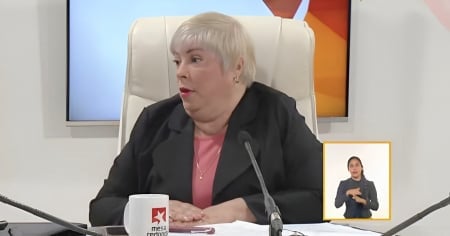In a new effort to capture foreign currency, a report presented on the official program Mesa Redonda stated that a new store will soon open at the intersection of 23 and C, in Havana, aimed at selling various products in dollars.
This measure is part of a broader strategy by the Ministry of Domestic Trade (MINCIN), which aims to strengthen commerce in foreign currency in response to the shortage of products available in national currency. Additionally, it will include national products from state entities and private sector mipymes.
Currently, the establishment operates with a wholesale sales service, but in a second phase it will allow direct purchases by the public using dollar (USD) cards.
In the future, the inclusion of cash payments is expected, depending on the legal framework for foreign investment in the country.
Until now, ten contracts have been finalized with national producers, including five with private businesses, in addition to the supply of imported products.
According to the television report, as part of the marketing strategy, the staff of these establishments is being trained to provide better customer service, offering guidance on the location of products, their prices, and characteristics.
This new store in Havana is joined by the mixed company Alma Caribe SA, whose goal is the wholesale and retail marketing of food and non-food products, both domestic and imported.
Sonia Rivero Batista, a Cuban manager of the company, stated that the opening of 15 stores in Havana is expected and, in a later phase, expansion to 50 establishments nationwide, including 48 new constructions. Additionally, an online commerce platform will be developed to facilitate access to these products.
MINCIN has justified this strategy by arguing that the supply in national currency is insufficient due to the contraction of production and the lack of liquidity to import goods.
According to the deputy minister Aracelys Cardoso Hernández, wholesale trade in foreign currency aims to ensure the supply of raw materials and essential products such as food and hygiene items.
In addition to Alma Caribe, the government has authorized 15 wholesale and retail businesses in foreign currency, eight of which are linked to the MINCIN business system.
Another key entity in this process is Mercalhabana SA. According to its vice president, Yaimara Pérez Barrera, this company will manage imports and exports to supply the wholesale channel and will participate as a shareholder in foreign investments.
Nevertheless, Pérez Barrera acknowledged that the current infrastructure has technological deficiencies, which requires modernization of equipment and refurbishment of facilities.
From the MLC to exclusive dollar stores
The stores in Freely Convertible Currency (MLC) in Cuba as a government measure to attract foreign currency and address the economic crisis and shortages of basic products.
These stores allow the purchase of products using cards linked to foreign currency accounts, excluding the use of Cuban pesos (CUP) and convertible pesos (CUC).
In recent months, the government has expanded this model, inaugurating establishments that accept United States dollars in cash or cards linked to foreign currency accounts.
For example, in January 2025, a supermarket opened at the intersection of 3rd and 70 in Havana, which only accepts dollars, offering a wide range of both local and foreign products.
However, this strategy has generated criticism because many Cubans do not have access to foreign currency, which deepens economic inequalities and limits access to basic products for a significant portion of the population.
Additionally, it has been observed that while these dollar stores are well-stocked, those operating in MLC or CUP face shortages, which exacerbates the perception of inequality.
Recently, some shops in MLC have started accepting cash payments in foreign currency, a measure that has not yet been implemented across the entire network of stores, but which is expected to expand in the coming months.
This partial dollarization of the Cuban economy highlights the growing inequalities and challenges that the population faces in their daily lives.
Frequently Asked Questions about the Opening of New Dollar Markets in Cuba
What is the purpose of opening a new dollar store in Vedado?
The opening of a new store in dollars in Vedado is part of a strategy by the Cuban government to attract foreign currency. These types of stores allow the government to generate income in foreign currency amid an economic crisis and shortage of basic goods. The store will offer both domestic and imported products, and in a second phase, it will enable direct purchases by the public using dollar cards.
How does the partial dollarization of the Cuban economy affect the population?
The partial dollarization of the Cuban economy exacerbates economic inequalities. Many Cubans do not have access to foreign currency, which limits their purchasing power in these stores. While dollar stores are well-stocked, those operating in freely convertible currency (MLC) or Cuban pesos face shortages, increasing the perception of inequity and making it difficult for a significant portion of the population to access basic products.
What criticisms have arisen from the opening of dollar stores in Cuba?
The opening of dollar stores has generated criticism for deepening economic inequalities in Cuba. Citizens without access to dollars find themselves excluded from purchasing basic products, while the dollar stores are well-stocked. This situation creates a market segmentation that leaves many Cubans on the sidelines, increasing social discontent.
What products will be offered at the new dollar store in Vedado?
The new dollar store in Vedado will offer a variety of national and imported products. These include food and non-food items provided by state entities and private sector small and medium-sized enterprises (mipymes). In the initial phase, sales will be wholesale, and later direct purchases by the public will be allowed using dollar cards.
Filed under:
